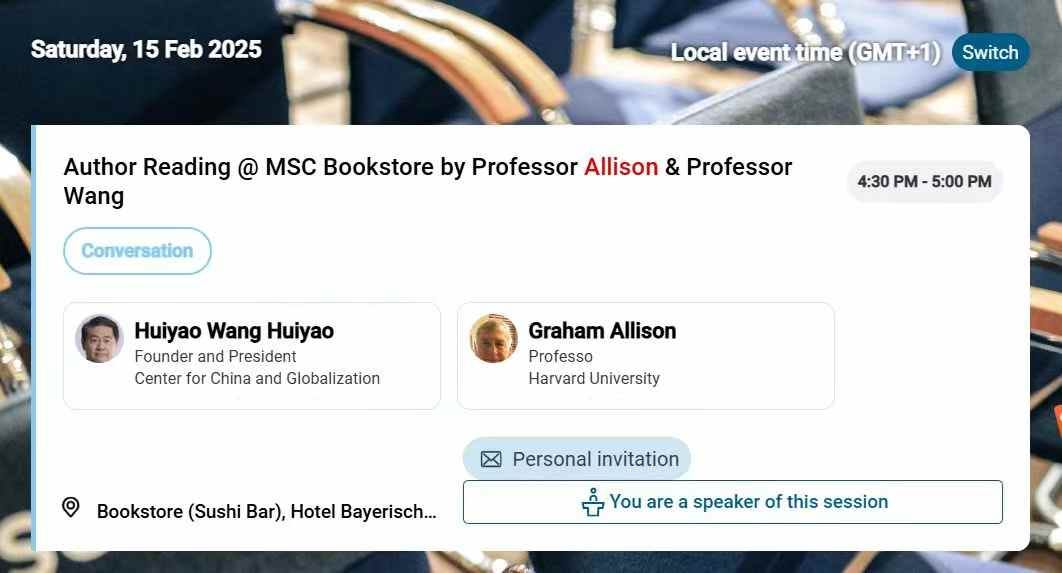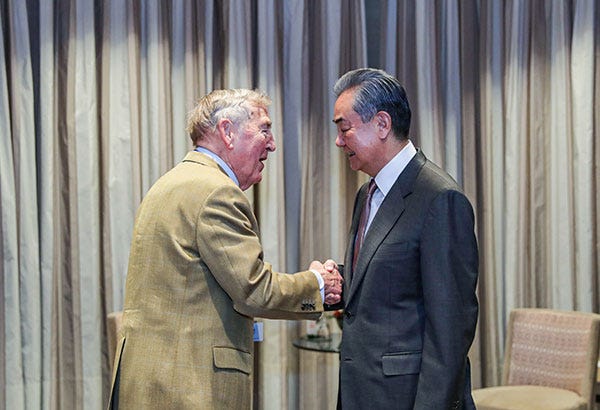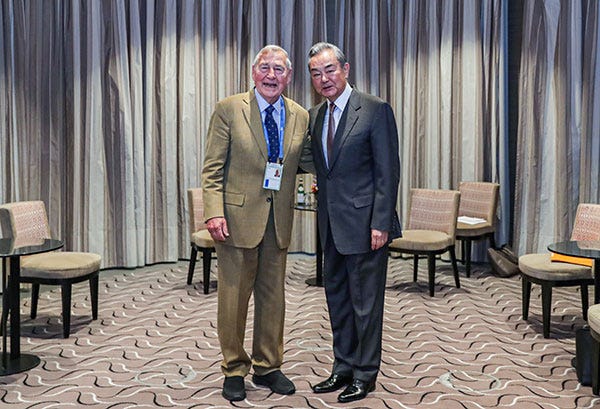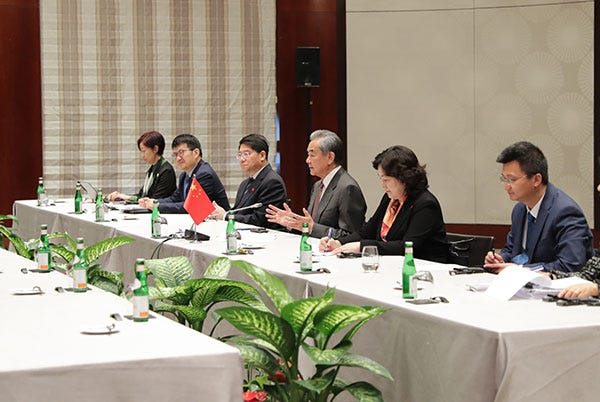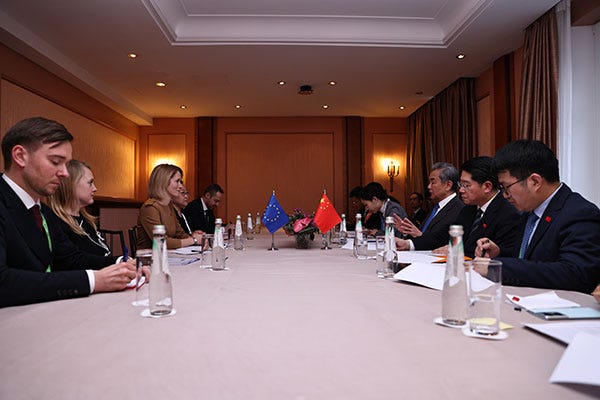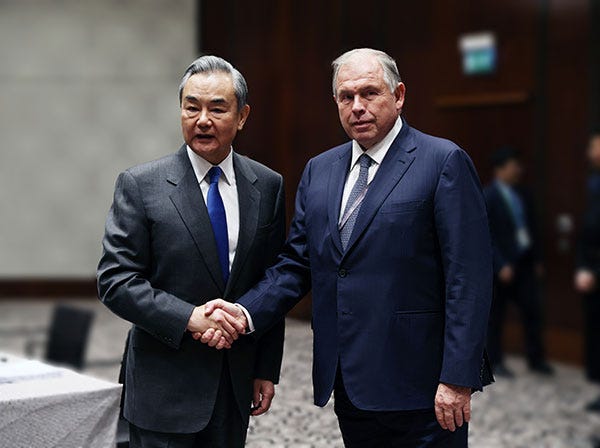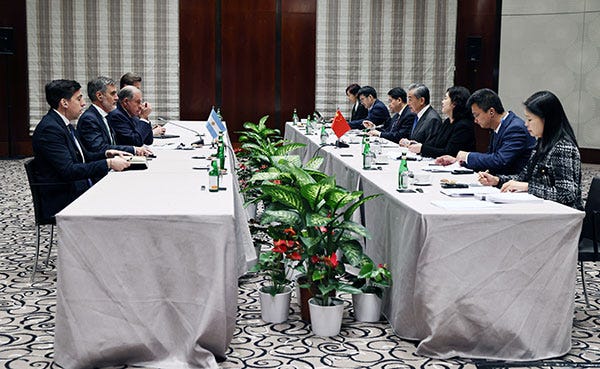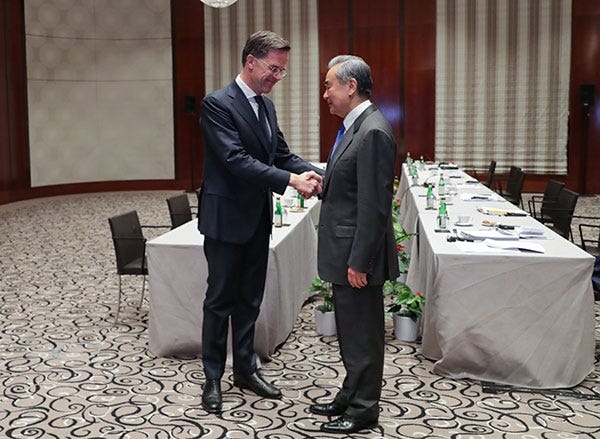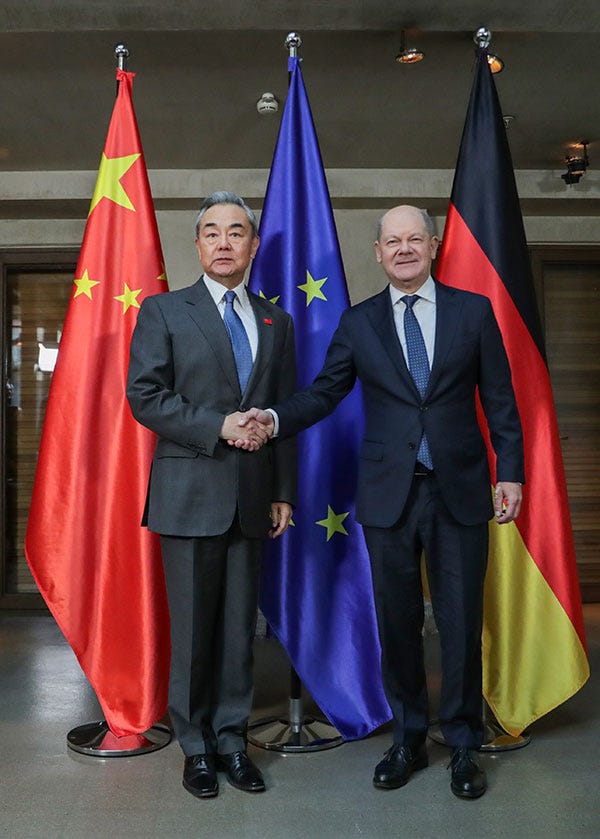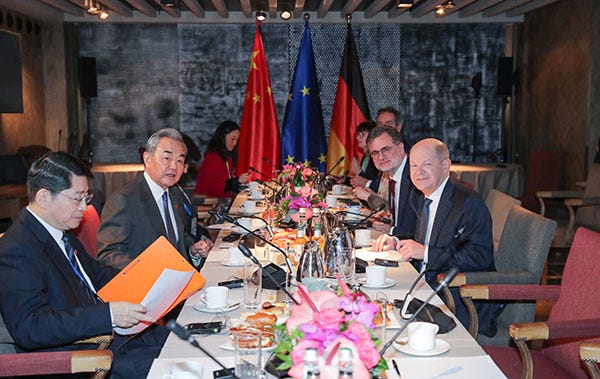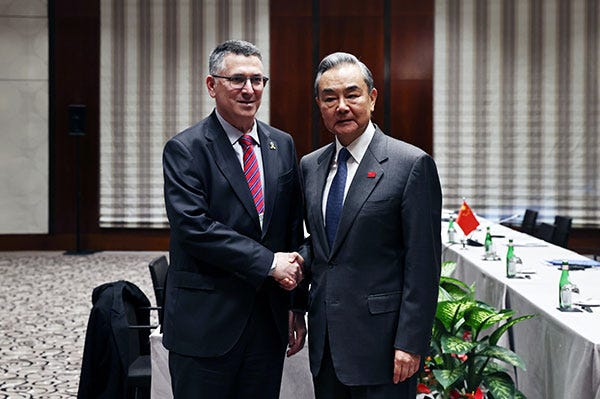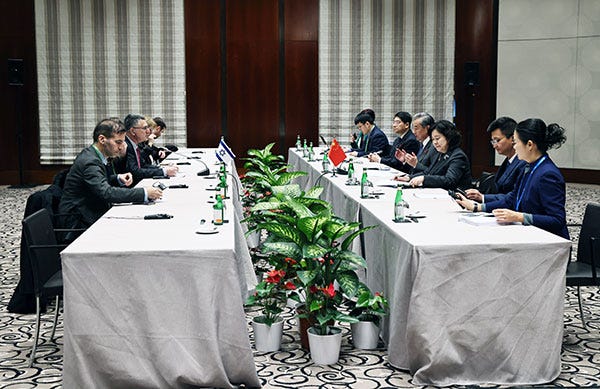Wang Yi meets Allison, Merz, Kallas, Baerbock, Werthein, Rutte, Scholz, Barro, Albares, & Sa'ar in Munich
Readouts of China's top diplomat meeting Havard professor, German Chancellor, EU HR/VP, NATO Secretary-General, CDU Chairman, & German, French, Spanish & Israeli FMs in Munich Security Conference 2025
The U.S. State Department’s Office of the Spokesperson constantly sends out English-language press releases via email en masse. No one in the world apparently does that with regard to China, despite the world’s second-largest economy’s importance. But there is apparently tremendous demand. So I’ll just play that role today, following yesterday’s transcript.
On the sidelines of attending the ongoing Munich Security Conference (MNC) 2025, where his main activity is to speak at “Conversation with China”, Wang Yi, China’s top diplomat also had important meetings with important people.
Below are my English-language translations of the press releases put out by China’s foreign ministry in Chinese on these meetings from Feb. 14 and 15.
Some notes before we move on to them:
Graham Allison, the Harvard professor, is the only person outside foreign governments that Wang Yi met. Allison just published Is Trump a China hawk? How Trump, like Nixon, could form a partnership with China. in the Washington Post 10 days ago. He also told a World Economic Forum panel in Davos last month that ‘We’ll be surprised’ by US-China improvements.
The former Assistant Secretary of Defense in the 1st Clinton Administration and “Founding Dean” of Harvard’s John F. Kennedy School of Government is a former student, colleague, and friend of the late Henry Kissinger. Beijing has been publicly searching for the new Kissinger, and Allison seems to top the list, at least according to the Washington Post. Allison met senior Chinese leader Wang Huning one-on-one in December 2024, and before that, as the only strategist together with American business tycoons, met Chinese President Xi Jinping in March 2024.
Henry Huiyao Wang, founder and President of the Center for China and Globalization (CCG), and Professor Allison will host an “Author Reading” at MNC Bookstore tomorrow/Sunday afternoon in Hotel Bayerischer Hof, the MNC venue.
Henry Huiyao Wang’s Escaping Thucydides’s Trap: Dialogue with Graham Allison on China–US Relations is available in English and Chinese.
Among the drama in Munich, that the U.S. could override Ukraine and European allies to negotiate with Russia unilaterally seems most alarming to Europeans. As Ukrainian President Volodymyr Zelenskyy said publicly at the MNC,
"A few days ago, President Trump told me about his conversation with Putin. Not once did he mention that America needs Europe at the table. That says a lot."
It is therefore eye-catching that Wang Yi told EU High Representative Kaja Kallas that China “supports Europe's important role in the peace talks.”
Germany will hold its next parliamentary election on Feb 23. While in Munich, JD Vance, the U.S. Vice President, broke a taboo by meeting AfD leader Alice Weidel. That and his speech irritated German mainstream politicians. The German chancellor accused Vance of unacceptable interference in Germany’s coming elections.
According to the Chinese official press releases, Wang Yi met three German leaders - each from the mainstream parties that make up the current governing alliance. They are Chancellor Olaf Scholz, of the Social Democratic Party; Friedrich Merz, Chairman of the German Christian Democratic Union (CDU); and Annalena Baerbock, German foreign minister of the Greens. Wang pledged China does not interfere in the internal affairs of other countries.
Among the major European powers, Wang didn’t meet any British officials in Munich. That is because he just concluded high-level talks in London, meeting the Prime Minister Keir Starmer, National Security Advisor Jonathan Powell, and Foreign Secretary David Lammy for the 10th China-UK Strategic Dialogue.
China has always stood against NATO expansion into Asia. Wang Yi told Mark Rutte, NATO Secretary-General and former Dutch Prime Minister, that he “urged NATO to adhere to its role as a regional defensive organization and contribute constructively to global and regional peace.” Beijing’s readout says Rutte “emphasized that NATO, as a regional defensive organization, has no intention and will not expand into Asia.”
Notwithstanding China’s support for Palestine, Wang told Gideon Sa’ar, the Israeli foreign minister, that “since the establishment of diplomatic relations more than 30 years ago, bilateral ties have made significant progress, with pragmatic cooperation steadily advancing in various fields. China views its relationship with Israel from a long-term perspective and is willing to work with Israel to advance the China-Israel Innovative Comprehensive Partnership.”
The Chinese readout says Sa’ar, the Israeli foreign minister expressed gratitude for “the contributions made by Chinese workers in recent years despite wartime difficulties in Israel. He stated that Israel has high expectations for its relationship with China, and reaffirmed Israel’s commitment to the one-China policy. Israel is willing to maintain dialogue and communication with China and to expand cooperation in various fields.”
One of my China 101 would be the difference between one-china policy and one-china principle. As you will read below, only Argentina pledged a commitment to the one-China principle. Others talk about a one-China policy. Of course, China has long supported Argentina over the UK on the Malvinas Islands, which the Britons call the Falkland Islands.
王毅会见美国哈佛大学教授艾利森
Wang Yi Meets with Harvard University Professor Graham Allison
On February 14, 2025, local time, Member of the Political Bureau of the CPC Central Committee and Foreign Minister Wang Yi met with Harvard University Professor Graham Allison during the Munich Security Conference.
Wang Yi stated that, in the face of accelerating global changes unseen in a century and the intertwining of international turmoil and crises, China must:
1. Maintain strategic resolve, remain unwavering in managing its own affairs, and vigorously advance Chinese-style modernization.
2. Fulfill its responsibilities and obligations as a major power, continue injecting greater certainty into the world, and play a constructive role in promoting global peace and stability.
3. Work together with like-minded countries to uphold the fundamental principles of international relations based on the UN Charter, advance the democratization of international relations, and advocate for a multipolar world that is equal and orderly, as well as an inclusive and mutually beneficial economic globalization.
Wang Yi emphasized that China’s policy toward the United States remains consistent and stable. China will continue to follow the principles of mutual respect, peaceful coexistence, and win-win cooperation proposed by President Xi Jinping in managing the evolution and development of China-U.S. relations, with the aim of promoting a healthy and stable bilateral relationship.
Graham Allison remarked that China’s foreign policy is rational and coherent, particularly noting that President Xi Jinping’s vision of building a community with a shared future for mankind embodies profound Eastern philosophical wisdom. He expressed hope that the United States and China, as two major powers, can engage in effective cooperation and play a significant role in addressing international and regional hotspot issues, such as the Ukraine crisis.
王毅会见西班牙外交大臣阿尔瓦雷斯
Wang Yi Meets with Spanish Foreign Minister Albares
On February 14, 2025, local time, Member of the Political Bureau of the CPC Central Committee and Foreign Minister Wang Yi met with Spanish Foreign Minister José Manuel Albares during the Munich Security Conference.
Wang Yi stated that China-Spain relations have seen remarkable progress, with close interactions between the two countries’ leaders, significant advancements in major new energy cooperation projects, and new opportunities emerging in trade and investment. This year marks the 20th anniversary of the China-Spain Comprehensive Strategic Partnership and the 50th anniversary of China-EU diplomatic relations. China is willing to work with Spain to implement the important consensus reached by the two leaders, achieve more tangible outcomes in China-Spain relations, and contribute to both countries’ economic development and people’s well-being, while also injecting greater stability into China-EU relations. China welcomes more Spanish enterprises to deepen their presence in the Chinese market, share the opportunities brought by China’s vast market and economic transformation, and jointly develop new areas of cooperation in the digital economy, artificial intelligence, and other emerging fields.
Wang Yi emphasized that China and Spain maintain good communication and coordination in international affairs. In the face of global turbulence and rising risks of a return to the ‘law of the jungle,’ China and Spain should jointly uphold multilateralism, promote the democratization of international relations, build broad international consensus, and work together to advance an equal and orderly multipolar world.
Albares stated that last year was a milestone year for Spain-China relations, with a historic meeting between the two countries’ leaders and major achievements in pragmatic cooperation across trade, culture, tourism, and other sectors. Spain is willing to strengthen high-level exchanges with China, expand mutually beneficial cooperation, and continuously elevate Spain-China relations to new heights. He also noted that China is a globally influential major power, playing an indispensable leadership role in maintaining world peace and addressing major international issues such as climate change. Spain supports multilateralism and is willing to enhance cooperation with China to uphold the authority of the United Nations and accelerate progress on the UN 2030 Sustainable Development Agenda.
The two sides also exchanged views on issues of mutual concern.
王毅会见德国基民盟主席默茨
Wang Yi Meets Chairman of the German Christian Democratic Union (CDU) Merz
On February 14, 2025, Wang Yi, a member of the Political Bureau of the Communist Party of China (CPC) Central Committee and the Foreign Minister of China, met with Friedrich Merz, the Chairman of the Christian Democratic Union (CDU) of Germany, during his attendance at the Munich Security Conference.
Wang Yi stated that over the 50-plus years since the establishment of diplomatic relations, China and Germany have respected each other, treated each other as equals, and pursued mutual benefit and win-win cooperation, becoming comprehensive strategic partners. This is a valuable asset in China-Germany relations. History has proven that Germany's friendly policy towards China is in line with Germany's own interests and the wishes of its people, and aligns with the trend of globalization. China is now fully advancing its modernization efforts, focusing on high-quality development and high-level openness, which will bring new opportunities for China-Germany cooperation. He expressed hope and confidence that Germany will continue to adopt a rational and pragmatic attitude, maintain equal and open dialogue with China, expand mutually beneficial cooperation, and continue the successful story of mutual achievement and shared prosperity between the two countries. China supports Germany's greater role in global and regional affairs, especially in the current turbulent international situation, and is willing to strengthen coordination and cooperation with Germany to jointly support free trade and practice multilateralism.
Merz stated that the foundation of Germany-China relations is solid, and the cooperation between the two countries in various fields has made significant progress over the past 50-plus years. The CDU/CSU attaches great importance to its relations with China and closely follows China's modernization process. Germany is willing to work with China to maintain the positive momentum in bilateral relations and promote further success in Germany-China cooperation. Germany firmly supports free trade and the deepening of cooperation between Germany and China, as well as between the EU and China. Germany is also willing to play a constructive role in resolving EU-China frictions.
Both sides also exchanged views on the Ukraine issue.
王毅会见欧盟外交与安全政策高级代表卡拉斯
Wang Yi Meets EU High Representative for Foreign Affairs and Security Policy Kallas
On February 14, 2025, Wang Yi, a member of the Political Bureau of the CPC Central Committee and the Foreign Minister of China, met with Kaja Kallas, the High Representative of the European Union for Foreign Affairs and Security Policy, during his attendance at the Munich Security Conference.
Wang Yi said that this year marks the 50th anniversary of the establishment of diplomatic relations between China and the European Union. Both sides should take this opportunity to summarize the successful development experiences accumulated so far, anchor the partnership, adhere to the main theme of dialogue and cooperation, stabilize the main theme of mutual benefit and win-win cooperation, and continue to be strategic partners who respect each other, trust each other, and maintain long-term stability. China is willing to work with the EU to organize a series of celebratory activities and prepare for the next China-EU leaders' meeting, to plan a new blueprint and inject new momentum into the next 50 years of China-EU relations.
Wang Yi stated that there are no fundamental conflicts of interest or geopolitical contradictions between China and the EU. Both sides are committed to practicing multilateralism, upholding the central role of the United Nations, believing that international hotspot issues should be addressed through dialogue and consultation, and opposing unilateral bullying. China is willing to strengthen strategic communication with the EU, enhance mutual understanding, and jointly provide more stability to the world.
Kallas said that the EU attaches great importance to China and is willing to work together to prepare for the EU-China leaders' meeting and celebrate the 50th anniversary of EU-China diplomatic relations. The EU appreciates China's leading role in addressing climate change and other areas, and is willing to work with China to uphold multilateralism and the purposes and principles of the United Nations Charter.
Both sides also exchanged views on the Ukraine crisis. Wang Yi elaborated on China's position, emphasizing that China supports all efforts conducive to peace and supports Europe's important role in the peace talks.
王毅会见德国外长贝尔伯克
Wang Yi Meets German Foreign Minister Baerbock
On February 14, 2025, Wang Yi, a member of the Political Bureau of the CPC Central Committee and the Foreign Minister of China, met with Annalena Baerbock, the Foreign Minister of Germany, during his attendance at the Munich Security Conference.
Wang Yi said that multipolarization is an inevitable trend in historical development and is also the theme of this year's Munich Security Conference report. Facing the current rise of protectionism, the resurgence of Cold War mentality, and the rampant unilateral bullying, China is willing to strengthen communication and coordination with Germany and other countries to build a broad consensus. China aims to send a more unified voice for maintaining international peace and stability, and believes that Germany will play an important role in the process of global multipolarization.
Wang Yi stated that China-Germany relations have maintained a good momentum of development and have always been a stabilizing factor in China-EU relations. As Germany is about to hold general elections, China does not interfere in the internal affairs of other countries. China values the achievements of mutually beneficial cooperation between China and Germany, and is willing to strengthen dialogue and cooperation with the new German government to continuously inject new momentum into China-Germany relations. China is firmly committed to the path of green transformation and sustainable development, and is willing to strengthen cooperation with Germany to jointly address global challenges such as climate change.
Baerbock said that Germany highly values exchanges and cooperation with China in various fields and is willing to expand areas of common interest with China to become reliable partners for each other. The German government adheres to the one-China policy and is willing to continue to strengthen candid communication with China and deepen dialogue and cooperation. Germany opposes tariff wars and trade wars, and is willing to work with China to jointly uphold multilateralism and free trade. Germany looks forward to further strengthening coordination with China on global issues such as green development.
Both sides also exchanged views on the Ukraine crisis and other issues.
王毅会见阿根廷外长韦特海因
Wang Yi Meets with Argentine Foreign Minister Werthein
On February 14, 2025, local time, Member of the Political Bureau of the CPC Central Committee and Foreign Minister Wang Yi met with Argentine Foreign Minister Werthein at the latter’s request during the Munich Security Conference.
Wang Yi stated that China and Argentina have long maintained friendly relations, and their cooperation is based on equality and mutual benefit. Last year, President Xi Jinping and President Milei held a meeting, reaching an important consensus on consolidating and developing China-Argentina relations. China is willing to work with Argentina to implement the consensus reached by the two heads of state, strengthen high-level and sectoral exchanges, and elevate bilateral relations to a new level, bringing greater benefits to both nations. Both sides should continue to respect and accommodate each other’s core interests and major concerns, continuously solidifying the political foundation of bilateral relations.
Wang Yi emphasized that China does not seek spheres of influence nor engage in geopolitical competition. Instead, it firmly upholds multilateralism in international affairs and is willing to work with Latin American countries, including Argentina, to resolutely safeguard international law and fundamental norms governing international relations. China-Argentina relations are an important part of China-Latin America relations. Over the past ten years since the establishment of the China-Latin America Forum, it has strongly promoted China-Latin America cooperation, bringing tangible benefits to the peoples of both sides. China is willing to work with Latin American countries to support the forum’s growth, helping China and Latin America achieve common development and shared prosperity.
Werthein stated that Argentina highly values its relations with China and looks forward to strengthening high-level exchanges and deepening pragmatic cooperation with China. He thanked China for supporting Argentina in defending its sovereignty over the Malvinas Islands. Argentina firmly upholds the one-China principle and is willing to be a reliable and stable partner of China. Argentina also hopes to play an active role in promoting Latin America-China relations based on the strong foundation of bilateral ties.
王毅会见北约秘书长吕特
Wang Yi Meets with NATO Secretary General Rutte
On February 14, 2025, local time, Member of the Political Bureau of the CPC Central Committee and Foreign Minister Wang Yi met with NATO Secretary General Rutte at the latter’s request during the Munich Security Conference.
Wang Yi stated that China is a force for peace and stability. As the permanent member of the UN Security Council that has sent the most peacekeeping personnel, China has also become the second-largest contributor to UN peacekeeping funding. Regarding peace and security issues, China holds the best track record among major powers. He expressed hope that Secretary General Rutte would guide NATO toward a rational and pragmatic approach, fostering an objective and correct perception of China and adopting a positive and responsible China policy. Amid ongoing and escalating geopolitical conflicts, Wang urged NATO to adhere to its role as a regional defensive organization and contribute constructively to global and regional peace.
Rutte stated that China is a great country, and its development is impressive. He emphasized that NATO, as a regional defensive organization, has no intention and will not expand into Asia. He also expressed NATO’s willingness to enhance dialogue and communication with China to deepen mutual understanding and trust.
The two sides exchanged views on the Ukraine crisis. Rutte stated that NATO highly values China’s influence and role and hopes that China will play an important role in achieving an early and peaceful resolution to the Russia-Ukraine conflict. Wang Yi elaborated on China’s principled position, stating that China will continue to work with all parties to promote a political resolution to the crisis and contribute constructively to building a balanced, effective, and sustainable European security framework.
德国总理朔尔茨会见王毅
German Chancellor Scholz Meets with Wang Yi
On February 15, 2025, local time, German Chancellor Olaf Scholz met with Member of the Political Bureau of the CPC Central Committee and Foreign Minister Wang Yi in Munich.
Wang Yi first conveyed the cordial greetings of the Chinese leadership to Chancellor Scholz. He noted that China and Germany have maintained frequent high-level interactions and that their pragmatic cooperation has sustained strong momentum, yielding positive results, which aligns with the fundamental and long-term interests of both peoples. At present, unilateralism and protectionism are on the rise, but the global trend toward multipolarity is unstoppable. As strategic partners, China, Germany, and Europe should strengthen unity, coordination, and cooperation, uphold free trade, practice multilateralism, and safeguard the authority of the United Nations. Germany, as a European power with global influence, has an important role to play in a multipolar world order, and China welcomes Germany’s contributions in this regard. China is willing to deepen comprehensive cooperation with Germany, promote the positive development of bilateral relations, and contribute to global peace and stability, bringing more certainty to an increasingly volatile world.
Wang Yi emphasized that this year marks the 50th anniversary of diplomatic relations between China and the European Union (EU), a milestone that connects the past and the future. He called on both sides to leverage their complementary strengths, deepen pragmatic cooperation, and work together to open the next chapter in China-EU relations over the next 50 years. Wang expressed China’s appreciation for Germany’s rational and pragmatic stance on the EU’s electric vehicle tariff issue, and hoped that Germany would continue playing a constructive role in resolving China-EU trade frictions.
Chancellor Scholz asked Wang Yi to convey his sincere greetings and best wishes to the Chinese leadership. He stated that Germany highly values its relations with China and is committed to strengthening exchanges and dialogue at all levels, as well as deepening bilateral and multilateral strategic cooperation. Germany opposes protectionism and tariff wars, expressing hope that China and the EU would adopt a constructive approach to resolving trade disputes, particularly on electric vehicles, and jointly uphold the free trade system.
The two sides also exchanged views on the Ukraine crisis. Wang Yi elaborated on China’s position, emphasizing that China and Europe share the same goal in promoting a peaceful resolution to the Ukraine crisis. He highlighted the need to explore the establishment of a balanced, effective, and sustainable European security framework, aiming to reach a lasting peace agreement and ensure long-term stability in Europe. China is willing to maintain communication with Germany and other relevant parties and will continue playing a constructive role in facilitating dialogue and peace negotiations.
During his visit to Germany, Wang Yi also met with Friedrich Merz, Chairman of the Christian Democratic Union (CDU), and other political figures.
王毅会见以色列外长萨尔
Wang Yi Meets with Israeli Foreign Minister Sa’ar
On February 15, 2025, local time, Member of the Political Bureau of the CPC Central Committee and Foreign Minister Wang Yi met with Israeli Foreign Minister Gideon Sa’ar at the latter’s request after attending the Munich Security Conference.
The two sides focused on exchanging views on the situation in Gaza. Sa’ar elaborated on Israel’s position. Wang Yi emphasized that the Palestinian issue is at the core of the Middle East problem, and that responding to violence with violence will only lead to a new cycle of escalation. He stressed that the humanitarian disaster in Gaza must be brought to an end as soon as possible. China hopes that the ceasefire arrangements will be effectively implemented, and on that basis, efforts should be made to achieve a comprehensive and lasting ceasefire. Wang Yi stated that the fundamental solution to the Middle East issue lies in implementing the ‘two-state solution,’ ultimately achieving peaceful coexistence between Israel and Palestine, as well as friendly exchanges between the Arab and Jewish peoples. China is willing to continue upholding justice and playing a constructive role in achieving a comprehensive and lasting resolution to the Palestinian issue.
Regarding China-Israel relations, Wang Yi noted that the Chinese and Jewish peoples have a long history of interactions. Eighty years ago, during the anti-fascist war, the two peoples sympathized with and supported each other, forging a deep friendship. Since the establishment of diplomatic relations more than 30 years ago, bilateral ties have made significant progress, with pragmatic cooperation steadily advancing in various fields. China views its relationship with Israel from a long-term perspective and is willing to work with Israel to advance the China-Israel Innovative Comprehensive Partnership.
Sa’ar expressed gratitude to the Chinese people for sheltering and protecting Jewish refugees during World War II, as well as for the contributions made by Chinese workers in recent years despite wartime difficulties in Israel. He stated that Israel has high expectations for its relationship with China, and reaffirmed Israel’s commitment to the one-China policy. Israel is willing to maintain dialogue and communication with China and to expand cooperation in various fields.
王毅会见法国外长巴罗
Wang Yi Meets with French Foreign Minister Barro
On February 15, 2025, local time, Member of the Political Bureau of the CPC Central Committee and Foreign Minister Wang Yi met with French Foreign Minister Jean-Noël Barrot at the latter’s request after attending the Munich Security Conference.
Wang Yi stated that last year, President Xi Jinping paid a milestone visit to France, during which both countries celebrated the 60th anniversary of their diplomatic relations and opened a new chapter in China-France relations, marking the beginning of a new cycle. This year marks the 80th anniversary of the victory in the World Anti-Fascist War and the 80th anniversary of the founding of the United Nations. China and France, as permanent members of the UN Security Council and major global powers, share a strategic relationship that extends beyond bilateral ties and carries significant demonstrative value. China is willing to work with France, guided by the important consensus reached between the two heads of state, to advance cooperation across various fields. Both sides should uphold their traditions of independence and autonomy, embrace the belief in openness and mutual benefit, and jointly serve as stabilizing forces in maintaining the international order and promoting global growth.
Wang Yi emphasized that trade frictions are challenges within the broader China-EU cooperation process. As comprehensive strategic partners, he expressed confidence that China, France, and the EU possess the wisdom and capability to properly handle these issues. He hoped that the EU would adhere to principles of openness and cooperation, support free trade, and work together with China to accommodate each other’s legitimate concerns. China is willing to continue engaging in constructive dialogue with the EU on these matters.
Barro stated that France appreciates China’s clear and firm stance in support of multilateralism at the Munich Security Conference and recognizes China’s role as a stabilizing anchor in global governance. As permanent members of the UN Security Council, France and China should play a leading role in upholding multilateralism and improving global governance. France will continue to uphold the one-China policy and is willing to enhance high-level exchanges with China while fully leveraging high-level dialogue mechanisms. France supports strengthening robust economic and trade relations between France, China, and the EU, properly handling trade disputes, and jointly resisting protectionism.
The two sides exchanged views on artificial intelligence, climate change, and maritime cooperation, agreeing to strengthen collaboration in global governance and promote international solidarity in addressing global challenges.
The two sides also exchanged views on the Ukraine issue. Wang Yi elaborated on China’s principled stance, emphasizing the need to advance peace negotiations step by step based on common ground among all parties and to establish a balanced, effective, and sustainable European security framework, ultimately ensuring long-term stability in Europe.
Both sides agreed to enhance communication and coordination on the Gaza conflict, working to de-escalate tensions and return to the ‘two-state solution’.
Additionally, the two sides exchanged views on the Iran nuclear issue and other regional matters.


